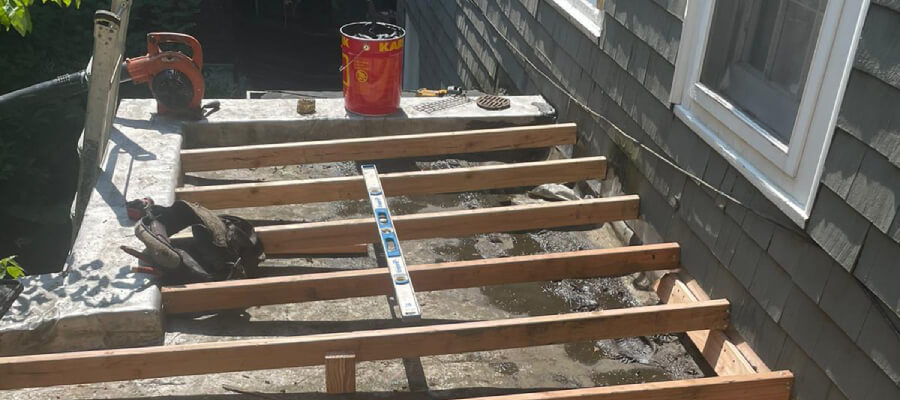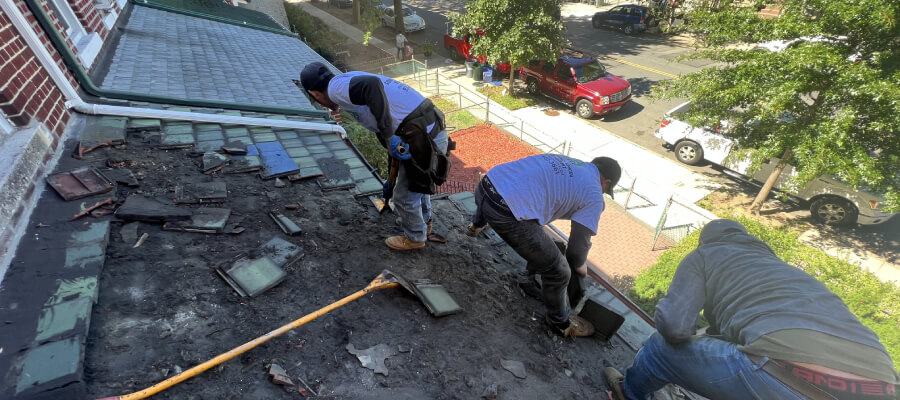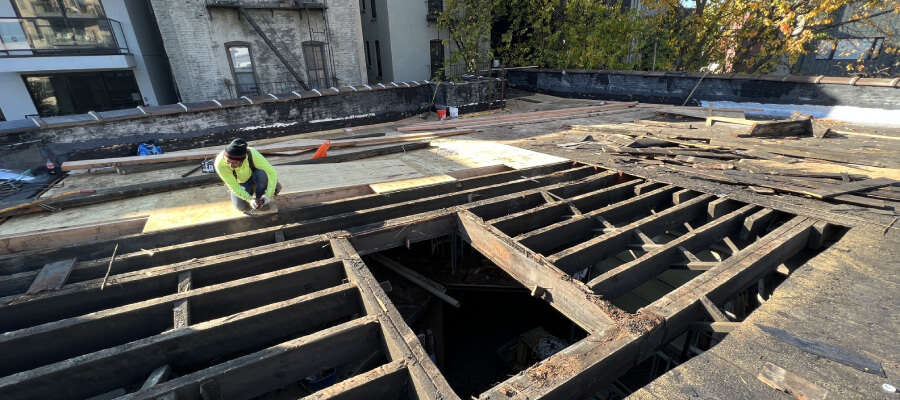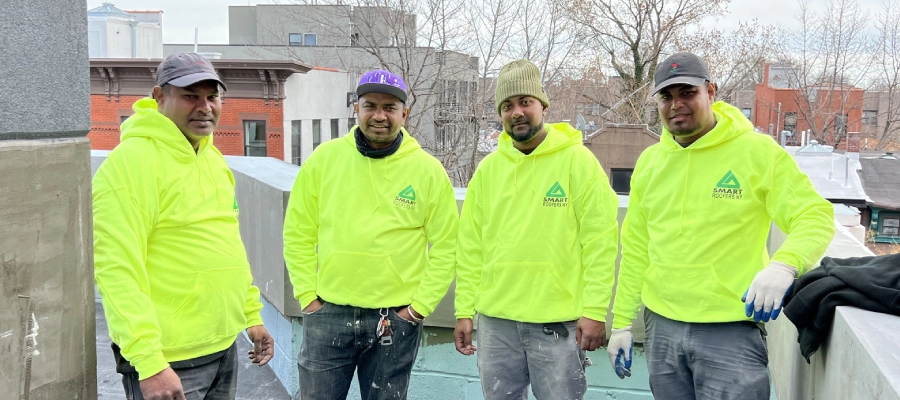Homeowners insurance policies are a must-have even if your home is completely paid off. But while an insurance policy is easy to get, it’s a challenge to know when and how to use it.
When should you file a claim, and what is the process? Will my insurance company cover me This can be especially confusing when it comes to roof insurance claims–it is a complicated process.
Many people are afraid to file a claim with their insurance company for roof damage because they aren’t sure of their coverage, how much the insurance company will pay, or if the company will honor the damage claim at all.
Let’s clear up some of the mystery with some facts and learn how picking the right roofing company can make the insurance claims process much easier.

Understand Homeowners Insurance Policies
As a homeowner, it’s important to maintain your roof because leaks that occur because of age or neglect are never covered by an insurance company. So just what is covered? You should check your particular insurance policy, but most insurance companies will honor claims if they originate because of these severe weather events.
 Wind damage
Wind damage
Roofs, especially shingled roofs, are vulnerable to wind damage. This is because high winds catch the edges of your roof or damage areas where you already have loose shingles. Winds can rip away those loose shingles and create a domino effect, tearing away shingles that weren’t loose at all.
Wind can also cause roof damage from falling objects and debris. This damage causes roof leaks that then damage your home. A claim for wind damage should be covered by your homeowner’s insurance policies.
If your home has been exposed to winds 45 mph or higher, it’s time to call a roofing contractor to do an inspection and perform roof repair before your home suffers additional damage. Your homeowner’s insurance should also pay for a contractor to secure your home until repair or replacement can be made.
 Hail damage
Hail damage
As part of your homeowner’s policy, your insurance policy should cover damage from hail. Smaller hail is not a problem, but any hail one inch in diameter or larger can wreak havoc on your roof, even if you have a flat roof.
How much damage hail does to your roof depends on the size, the speed of the wind and what direction it’s coming from, the roofing materials, the age of the roof, and its slope.
Hail damage can lead to leaks and other issues that can affect the integrity of your house and cause additional property damage.
Hail can damage gutters, siding, and your homeowner’s insurance should include coverage for not just roof damage but these other repair costs. This damage can affect the function of your roof, but it also can be cosmetic and look worse than it actually is.
Damage can be cosmetic or functional, and it’s the cosmetic damage that is sometimes more severe than it looks but can also cause problems down the line that may mean you have to replace your roof.
If you suspect that hail has damaged your roof, call a roofing contractor right away for a thorough inspection. When it comes to flat roofs, hail can blister the membrane and cause leaks which cause further damage to your home. Only a contractor can assess the damage to your roof and siding.
 Fire Damage
Fire Damage
While weather events such as high winds from hurricanes, tornadoes, or severe weather can damage your roof, your homeowner’s insurance company also covers damage from fire.

Things that Will Affect Your Roof Claim with Your Insurance Company
Even though you have suffered a covered event, that doesn’t mean your insurance company will automatically honor your insurance claim and cover roof repairs or roof replacement. Your roof insurance claim is affected by a number of factors that your insurance adjuster will take into consideration, and it will affect your claim payout or increase your premiums.
 How many homeowners insurance claims have you filed?
How many homeowners insurance claims have you filed?
If you have filed more than two claims in the past five years, filing another will likely drive up your premiums. When you call roofing companies for estimates, it may make more sense to pay for roof replacement or roof repair out-of-pocket rather than filing an insurance claim.
Meet with your insurance adjuster, see what they say, and then call your insurance company to find out what effect your roof damage claim will have on your premiums.
 What is the Age of Your Roof?
What is the Age of Your Roof?
This is a tricky area. If you have an old roof that’s nearing the end of its life, you might think that your insurance company won’t pay for roof repair or roof replacement. However, you might come out better than you think.
If you have an old roof that is damaged, you might end up with a whole new roof. This is because old shingles don’t have the flexibility to be peeled, so all the shingles surrounding that one will probably crack.
Since the insurance company isn’t going to pay for a roof repair that will cause more damage, you’ll get a roof replacement. If you have a new roof, it’s likely that, even with the same amount of damage, your insurance company will only pay for repairs.
 What is Your Roof Worth?
What is Your Roof Worth?
Roofs depreciate with age. Before you file a homeowners insurance claim, check your policy. Did you opt for actual cash value coverage or replacement cost value?
Actual cash value coverage has a lower monthly premium, but this coverage only pays for the value of your roof at the time you suffered the loss. Replacement costs are covered with more expensive premiums and will cover full replacement costs for your new roof.

Dealing With Your Insurance Adjuster
Once you file a homeowners insurance claim, the process begins as soon as you contact your insurance company.
They will assign an adjuster. It is the job of insurance adjusters to review the event that causes the damage, inspect the roof damage, and additionally, determine how much money the insurance company will pay you.
So what’s your part of the process?
First, contact a roofing contractor to assess the damage and provide a roof damage inspection report. Your adjuster likely will want to review multiple estimates from roofing contractors, so at the very least, get a second opinion.
While an adjuster can do their own inspection, they don’t have the knowledge or ability to provide a realistic estimate of repairs or replacement. Only a professional roofing contractor can do that and can assess with a thorough inspection whether you need your roof replaced or the roof damage can be repaired.

Tips for Filing Your Homeowner Insurance Claim
As we mentioned, insurance claims can be complicated, and sometimes your adjuster and you won’t agree on the damage or costs and what it’s going to take to make you whole. The adjuster works for the insurance companies, after all, and their job is to resolve the claim with as little cost to the company as possible.
To get the best possible outcome for your claim and have them cover as many costs and expenses as possible, it has to be approached properly from the first contact with your insurance company. After all, you want to be paid the maximum, which means knowing how to work with the process.
First, document everything to prove your claim. Take photos of any roof damage and take a lot of pictures. If your house was damaged by hail, try to take pictures of the largest hailstones, and use either a tape measure or golf ball to show the size.
Tour the entire exterior of your house and look for physical roof damage. If you have a pair of binoculars, grab them to get a closer look. Look for shingles that are missing, damaged, or cracked. We spoke of the domino effect before–missing roof shingles can mean water can enter your home.
If you can get into your attic. If a weather event has caused roof damage, there can be water penetration into your home, and your insurance claim should cover those repairs as well. The more factual documentation you can give about your claim, the better. And if possible, provide any invoices that show the cost of the roof.
Next, review your policy. It’s important that you understand your policy so you know what you can be compensated for. This isn’t just about your roof.
What if your home is so damaged you can’t live in it? Will your policy cover housing you and other expenses? It’s essential that you know your rights. You don’t have to take the first offer from the adjuster. Be sure to make a list of everything that was damaged and destroyed and what it will cost for repair or replacement.
And record all conversations, if you can, or at least take notes. Let the adjuster know you’re doing this, and then compare any settlement offer with your notes or recordings to make sure verbal promises are kept.
Under any circumstances, do not agree to the insurance company ever taking a recorded statement from you.
Then, get an inspection and estimate for repairs or roof replacement from roofing contractors. Contact several roofing companies. If the homeowner’s insurance company disputes your claim, you’ll want a backup that shows what it will take to restore or replace your roof.
Work with your roofing company to determine a settlement amount, and challenge the adjuster’s figure if they are far apart.
Never say the following things to your insurance adjuster:
Do not lie. Do not admit any fault or say things like, “The roof was old and needed some repairs anyway.”
You’re not a professional, so don’t offer your theories about what happened. In fact, the less you say, the better. Let the adjuster do the talking. Just factually substantiate costs and never offer an opinion.
Watch for unfair claims practices. Not every insurance company is honest, so don’t let them lie about your coverage, fail to communicate promptly, do a poor job of investigating, or offer a settlement that is unreasonably low.
Some insurance companies will not act in good faith, so if they deny your claim, they should provide you with an explanation. If they don’t, it’s time to choose another insurance company.

Finding the Right Roofing Company in Brooklyn
After disaster strikes, choosing the best roofing company is even more important than knowing how to file a claim and work with adjusters. You want accurate estimates; a company has the ability to decide if clients need to roof replacements or if a fix will do it.
You’ll also want a roofer who offers additional benefits, the most important of which is helping you with the insurance process so you get paid the maximum amount.
Not all roofing contractors are created equal. It’s important to hire a roofing contractor that offers a free and accurate estimate and won’t ever have you sign a contract until the final cost is negotiated.
At Smart Roofers NY, we’ve been doing roof repairs and roof replacements for almost 30 years. We’re known for our stellar quality, honesty, and for getting our clients the maximum insurance payout possible.

